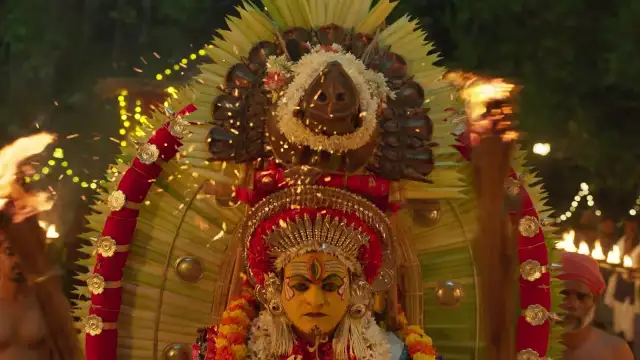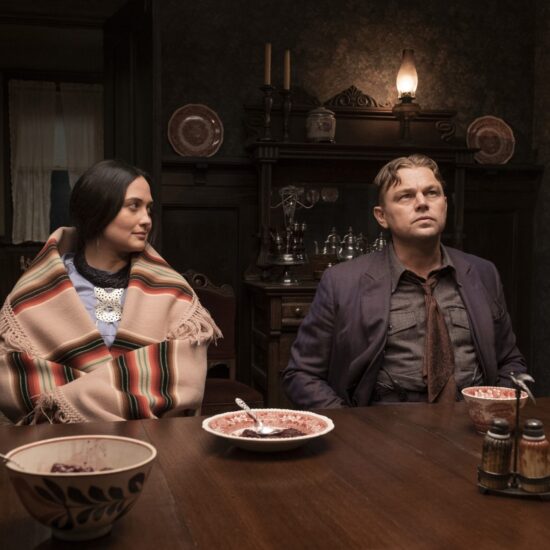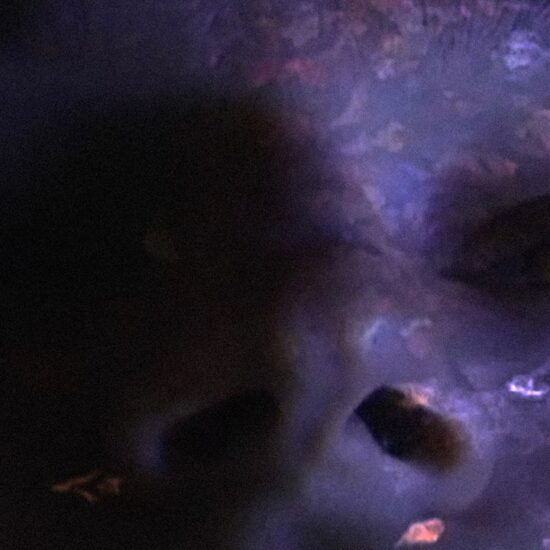
Kantara, review: Dispossessing the ‘possessed’
Kantara is about conflict. Conflict between nature and human beings. Conflict between landlords and their subjects. Between Forest Officers and villagers using forest resources for subsistence. Between two powerful and major landlords. Between humans and ‘possessed-by-deities’ humans. Between humans and wild beasts. Between a mother and her son. Between a hero and his nemesis. Between a film and its audience. Yes, a film and its audience. How much can you take, of actors going into a trembling trance on being possessed? How much can you take of a character who leads a charmed life an d his enemies give him every chance to fight their goons instead of shooting him down in one second? How much can you take of dialogue and cutting that moves at double the speed at which it might have been intelligible? How much can you take of LOUD soundtracks and songs that are unintentionally funny? How much of the 149 minutes can you sit through? Have a heart! I sat through the entire film. As did all the invitees at the press preview yesterday. How? We must have been possessed.
Back in 1847, a King in what is present day Karnataka state was sleepless and restless. He has a loving family, loving subjects and a rich kingdom. Yet, he had no peace of mind. Desperate to seek solace, he visited various shrines and temples and sought the blessings of various godmen. Nothing worked. Ultimately, one godman told him that he lacks the blessings of parents, and he can only find that in the jungle, where he must go alone. Following the soothsayer’s advice, he went into the jungle, and found a magic stone. The stone, a symbol of the daiva (local demigod, animist form of spirit, worshipped by locals of Tulunadu and some parts of Malenadu of Karnataka, and Kasargod in Northern Kerala, India) granted him his mental peace. Suddenly, hundreds of villagers appeared. They asked for a gift in return for his boon. He agreed. Their demand was that a large area of land, part of the King’s estate, be gifted to them. He agreed to this transfer of rights, and the land became theirs.
1n 1970, a successor of the King came back to the estate from Bombay and demanded that the large piece of land be returned to him. He threatened legal action against them if they refused, which they did. He went to court, but died, falling at the steps of the court, after vomiting blood, apparently cursed by the daiva. Twenty years later, his son, Devendra, came to the region and started living there. He became part of his former subjects (princes and kingdoms were abolished by the Indian government much earlier) and won them over. He presided over buffalo races (called kambala), where one Shiva always won, and generally became part of the people. But in his heart, even he had his eye on the land. His allies were the Forest Officers and his enemy number one was a man, Shiva. Shiva had tremendous strength and was loved by the whole village, although he drank like a fish and smoked pot like a chimney. His brother, Guru, performed the Kola dance, where the dancer gets possessed by a deity and speaks for him. Both the Officers and Devendra made many attempts to eliminate Shiva, but he always triumphed, So, Devendra decided to target Guru first.

The main actor, Rishab Shetty, is also the writer and director of the film, which is his fifth foray in the dual capacities. He has narrated it like a fairy tale and mounted the film on a very big scale, but there are loopholes galore in the movie. When the landlord goes to court, and falls dead, there is no one around. That is very strange. Devendra narrates his entire story, full of all his villainous deeds, to his mentally challenged son. What a strange thing to do! When he takes a man along with him in his jeep, kills him at a remote spot, with repeated thrusts of a knife, brings him back to the same village from where he had picked him up, and dumps his body there, he does not have the common sense to realise that he might have been seen, although it was a late hour. After the murder, a lot of blood spills on to his shoes, but again, he does not bother to check if any blood has soiled his body or apparel and footgear. One can go on, but one is not a film.
Rishab Shetty as Kaadubettu Shiva and Shiva’s father puts in a loud and over-the-top-performance, full of ego and attitude. That is also the demand of the character he has written for himself. Sapthami Gowda as Leela, his beloved, who joins the Forest Officer’s cadre and earns his ire, while submitting herself to him totally, has a confused part, and per performance is passable. Kishore as Muralidhar, a Deputy Range Forest Officer (D.R.F.O) officer, has an amazing similarity to Dwayne Johnson, but is made to look impotent for the greater part, getting into the action only during the climax. Achyuth Kumar as Devendra Suttooru manages to fool us into believing that he is do-gooder, till his true colours are revealed. Manasi Sudhir as Kamala, Shiva’s mother, who keeps admonishing him to mend his ways and runs after him with a stick, acts well, but the entire track seems funny, and pointless, in view of Shiva’s life-style, Naveen D Padil as an advocate is treated like a caricature. Swaraj Shetty as Guruva, Shiva’s cousin brother, who performs in the festival Kola as the nartak—dancer—who is possessed by daiva) does well in a small role. Just as Shiva’s mother keeps admonishing him, so also Raghu, Forest Officer, admonishes Murali. And that is all he does, about four times in the film.
Atish Shetty, as Devendra’s specially-abled son, has one scene, and does what he is asked to do, convincing us that he is especially abled. There are three cameo appearances: Shine Shetty as Devendra’s father, Vinay Biddappa as the King, Pragathi Rishab Shetty as the King’s wife. All three are okay in their respective personas. Behind the camera, we have cinematography Arvind S. Kashyap, in front of the monitor, we have editing by K. M. Prakash and Pratheek Shetty, and on the ‘keyboards’, we have music by B. Ajaneesh Loknath. Cinematography is generally good, except for some of the night scenes, which are not really visible. Editing is break-neck. Somebody should have told the director and the editor that after a certain speed, all dialogue becomes unintelligible. Even then, it is whopping 149 minutes long. Music would have been okay, if the songs and background score were played at a level 20 decibels lower. Lyrics are poorly written. One fishermen’s song from coastal Maharashtra, transposed to north Karnataka, sticks out like a sore thumb.
Kantara (translation: Mystical Forest) was originally made in Kannada and that version has already grossed five times the production budget. That qualifies it as a hit. Or, maybe even a super-hit. The producer, Hombale Films, also owns the block-buster KGF franchise. Neither fact sways my opinion. We saw a version dubbed in Hindi, where some of the lines were neither dubbed in Hindi nor sub-titled, although they sounded like Kannada. That appears to have been a deliberate decision, but we’ll never know the context. Kantara has spectacle, which my spectacles helped me notice, and besides my eyes, even they are sore. After all, how many grotesque faces can you enjoy in extreme close-up? My ear-drums were still sore, 12 hours after I saw the film, especially on account of a war-cry yelled a hundred times, at deafening volume, that went ‘Woooooooooooooooow’! Wow? Self-glorification?
This one is not for me, or those who care for my opinion. A tale of ‘possession’ and dispossession, I felt some of my faculties being dispossessed as I sat through Kantara. You still want to see it? There is something it does has to offer: two-time National Award winning action director Vikram More’s dazzling action, but a little too much of it. Yes, I know, for action lovers, more is less. So, be my guest, while I say sayonara to tantara! No, that is not a typo.
Rating: * ½














